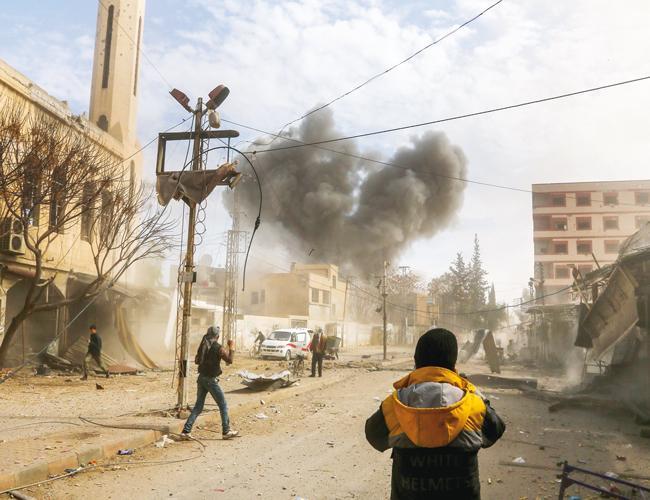Death toll exceeds in assault on rebels in Syria’s Eastern Ghouta
ARBIN

Syrian regime jets pounded Eastern Ghouta on Feb. 9, sending the death toll from a four-day assault on the rebel enclave on the outskirts of Damascus soaring past 220.
The death toll mounted steadily throughout Feb. 8, with the Syrian Observatory for Human Rights giving 75 civilians dead by the evening. Three died of wounds suffered on Feb. 7.
That brought to 228 the number of civilians killed since the regime launched a campaign on Feb. 5 of heavy air raids on the area, which has an estimated 400,000 residents.
Among them were at least 58 children, the Observatory said.
In Eastern Ghouta, which lies east of the capital and has been besieged since 2013, residents had no time to mourn their dead or treat their wounded from the previous day’s bombardment.
“These are the worst four days that Eastern Ghouta has ever gone through,” said Hamza, an overwhelmed doctor at the Arbin clinic who was treating wounded patients.
“From 2011 until now, there has never been the level of bombardment we’ve seen in the last 96 hours.”
“Children and teachers are terrified that at any moment they could be hit. The siege means there is nowhere for them to escape,” said Sonia Khush, Save the Children’s Syria response director.
“There must be an immediate halt to the fighting and an end to the siege.”
Moayad al-Hafi, a rescue worker, said his team was targeted as they retrieved bodies near Arbin.
“As we were pulling out the children and the dead from under the rubble, they targeted us with five rockets - directly targeting us,” said Hafi, 24.
At least two civilians were killed in retaliatory rebel mortar fire on government-controlled areas of Damascus, according to state news agency SANA.
AFP correspondents said mortars were raining down on Bab Touma late on Feb. 9.
Eastern Ghouta was one of several so-called de-escalation zones agreed last year by three of the main outside players in the conflict - Turkey, Iran and Russia.
Ankara announced on Feb. 8 that it would host a new three-way summit to revive efforts to end the war, which has killed at least 340,000 people and displaced millions since 2011.
Violence also flared in eastern Syria on Feb. 8, where the U.S.-led coalition said it had killed at least 100 pro-regime fighters to fend off an attack on the Syrian Democratic Forces (SDF), a U.S. ally on the ground dominated by the Syrian Kurdish People’s Protection Unit (YPG), which Turkey views as a terrorist group.
The clash marked a fresh escalation between Washington, which has threatened the regime over its alleged use of chemical weapons, and Damascus, which labelled the latest incident in eastern Syria a “war crime.”
Moscow also slammed the U.S.-led strikes, with Russia’s U.N. ambassador Vassily Nebenzia saying he had lodged a protest about the assault during a closed-door Security Council meeting.
“To confront those who really fight international terrorism on the ground in Syria is criminal,” he said.
















